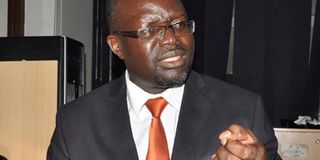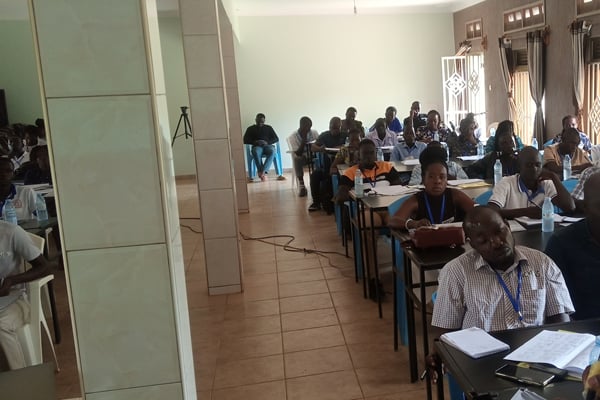Mamdani-Nyanzi saga is about insubordination- Barya

Prof Venansius Baryamureeba
Prof Mahmood Mamdani was recruited as executive director of Makerere University Institute of Social Research (MISR) when I was serving as Vice Chancellor of Makerere University. During the interviews for the job, one of his selling points was starting a five-year PhD by coursework and research that would build research capacity in the humanities and social sciences disciplines at Makerere University and the region.
Prof Mamdani also made it clear that he wanted to change the focus of MISR from consultancy-based institute to a respected research institute of global standing. As Appointments Board, we were satisfied with his overall performance and agreed to recruit him on his terms of spending 75 per cent of his time at Makerere University and 25 per cent at Columbia University every year. His joint appointment at both Makerere University and Columbia University would enable him to mobilise resources, including financial resources from the USA and beyond since he would be able to use his profile at Columbia University when necessary.
After his recruitment, Prof Mamdani immediately worked on the curriculum of the PhD programme that would be housed at MISR, but implemented by selected staff in the humanities and social sciences disciplines from Makerere University and beyond. As much as Mamdani spearheaded the development of the curriculum for the PhD programme, the Faculty of Social Sciences and Faculty of Arts that later merged to form the College of Humanities and Social Sciences where MISR belongs, reviewed the curriculum before it was presented to the Senate as a university programme. After approval by the Senate and the Council, I did fast-track the accreditation of this Makerere University PhD programme with the National Council for Higher Education (NCHE) when Prof Abdul Kasozi was still the executive director of NCHE. The PhD by coursework and research was later approved by NCHE as a Makerere University programme. So I get saddened when people keep calling it the Mamdani PhD!
With the establishment of the PhD programme at MISR, definitely, the duties of the PhD holders at MISR had to change to incorporate the new demands of this programme that included teaching and supervision. So at the inception of the implementation of this PhD programme, Prof Mamdani came back to management with a proposal to vary the workload terms of all PhD holders at MISR from 100% research to 75% research and 25% teaching and supervision on the PhD programme. Management advised Prof Madmdani that it was not necessary to take the proposal to the Appointments Board since as executive director MISR, he had powers to vary duties of staff under his supervision.
Every letter of a staff of Makerere University has this provision…. Undertake any other duties assigned to you by your supervisor’’. Appointment letters are generic and cannot include all the details. So he was advised that in his capacity as executive director to put it in writing for all PhD holders at MISR that their load would now constitute 75% research and 25% teaching and supervision on the PhD programme, which he did. Management also worked with him to have more PhD holders recruited at MISR by the Appointments Board on similar terms of 75% research and 25% teaching and supervision on the PhD programme. It should be noted that 25% workload is just 10 hours per week, which can be done in one day.
World over, doctorate/ PhD students and post-doctorate fellows (postdocs) are always given at least 25% tutorial and or teaching load per week under the guidance of their supervisors/advisors. “Knowledge exists to be imparted”, Emerson. So it’s shocking that a PhD holder, who is a research fellow, is completely opposed to an otherwise routine practice of taking on 25% teaching and supervision workload. It is also a common practice to find research fellows involved in teaching and supervision at (post) graduate level at almost all the best universities across the globe.
It is apparent Dr Nyanzi refused to take on the workload allocated to her by her supervisor, which is tantamount to abscondment from duty and insubordination. The appropriate university organs should have taken appropriate action when this became evident since the Human Resources Manual is very clear on cases of insubordination and abscondment from duty.
No doubt the PhD programme at MISR has not only brought research grants but also raised the profile of Makerere University and it is both critical and important that everybody focuses on the bigger picture of graduating the PhD students on this programme.
The architect of this PhD programme is Prof Mamdani and it is important that Makerere University weighs the consequences of not renewing his contract. My opinion is that Makerere University renews his contract with a condition that he takes one or two deputy directors, who can understudy him and continue with this good initiative once his contract of five years expires.
Dr Nyanzi may have personal issues with Prof Mamdani, but this cannot stop her from undertaking her duties. She must understand that MISR has an executive director as head where she works as a research fellow.
Prof Mamdani needs the support of management, including the Vice Chancellor, Prof [John] Ddumba [Ssentamu] if he is to succeed with the PhD programme hosted at MISR and also be able to spearhead the broader mandate of MISR as a centre of research excellence. The university Human Resources Manual has enough provisions to enable the Appointments Board to resolve not only the current impasse, but the root cause of the problem. Under the current circumstances, Makerere University needs to move faster and renew Prof Mamdani’s contract in order to build confidence in the donors of Makerere University, especially those supporting MISR, the staff and students participating in the PhD programme. Don’t say I never told you.
The author is a former Vice Chancellor Makerere University.




